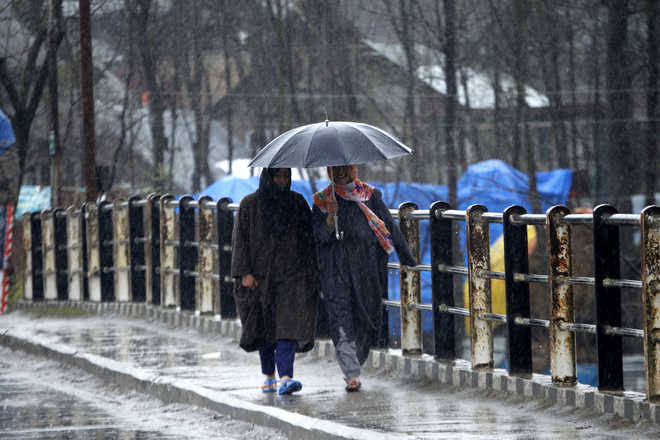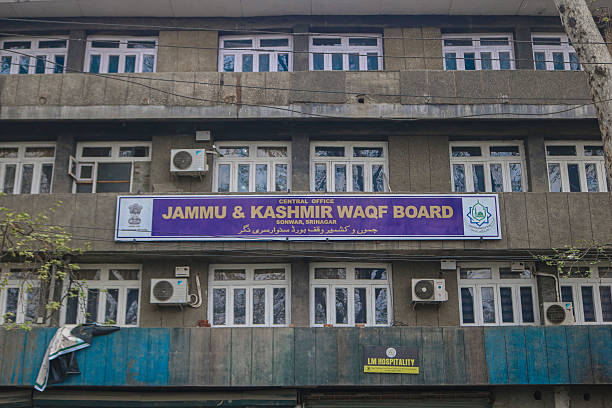Hussain Mir
Since coming to power in 2014, the Narendra Modi-led government has been repeatedly accused of taking measures that marginalize India’s Muslim community. From controversial citizenship laws to targeted demolitions and policing of religious expression, critics say the government has systematically worked to stifle minority voices in the country.
In the latest controversial move despite heated debates and objections, the Modi government passed the Waqf bill 2024 without consulting key Muslim stakeholders, sparking widespread concern.The Waqf amendment bill was passed in both the houses of the Indian parliament, in the Rajya Sabha with 128 members voting in favour and 95 opposing it. It was passed in the Lok Sabha early, with 288 members supporting it and 232 against it.
President Droupadi Murmu has also given her assent to the Waqf (Amendment) Bill, 2025.
Earlier, the Modi led Government introduced Waqf Amendment Bill in the Lok Sabha on August 8, 2024, with the intention of ensuring the effective management of Waqf properties and streamlining the operations of the Waqf Board. By amending the Waqf Act of 1995, the Waqf (Amendment) Bill of 2024 seeks to address the problems and difficulties associated with overseeing and managing Waqf properties.
The amended acts modifications include renaming the Act, revising the definitions of waqf, streamlining the registration procedure, and expanding the role of technology in keeping waqf records, seeks to strengthen the effectiveness of Waqf boards and solve the weaknesses of the previous act.
A Waqf, as defined by the Waqf Act of 1954, is a piece of property dedicated in God’s name for charity and religious reasons. In legal terms, it is the permanent commitment of any movable or immovable property by a Muslim to causes that are accepted by Muslim law as benevolent, religious, or pious. A property may be deemed a “ Waqf ” if it has been utilised for religious or charity reasons for an extended period of time, or it may be created through a deed or other legal document. A Waqf’s earnings are usually used to support shelter homes, mosques, graveyards, and educational organisations.Waqf is an Islamic custom that was codified during British rule by the Religious Endowments Act of 1863, which gave religious communities the authority to administer their estates. These assets, which include mosques, madrasas, graveyards, hospitals, and schools, are governed and safeguarded by national and state waqf boards, which were established by the Waqf Act of 1995. Many of these properties are centuries old and have historical and cultural value.
Observers believe that the bill allows non-Muslims to be appointed to Waqf Boards and expands government control over Muslim charitable endowments raising fears of interference in religious affairs and further erosion of Muslim autonomy in India. It would also give the government a bigger role in verifying and approving Waqf land records.The Indian American Muslim Council’s executive director, Rasheed Ahmed, said that the increased state control will deprive vulnerable populations of essential support and strip the community of its ability to address socio-economic inequality. These properties support countless schools, hospitals, and welfare projects serving Muslims.
It is said that Waqf properties, especially those involving large lands or commercial establishments, generate employment opportunities for the underprivileged sections of society. Through the leasing or renting of these properties, local communities can find jobs or develop skills to improve their livelihoods.
However, Union Home Minister Amit Shah addressed concerns in the Lok Sabha, saying that non-Muslim members on Waqf Boards will not be involved in religious matters but will monitor the administration of the Waqf law and whether funds given for donations are running smoothly or not. He accused opposition leaders of misleading people and spreading false information about the bill. Shah assured that the new law will not interfere with any community’s religious practices.
Watershed moment or interference in religious affairs
Indian Prime Minister Narendra Modi’s Bharatiya Janata Party (BJP) claims that the passing of this bill and amendment to the 1995 Waqf Act are meant to improve transparency, reduce corruption, and promote diversity within Waqf institutions. The president of India will now review and approve the bill before it becomes law.
Prime Minister Narendra Modi called it a “watershed moment”, saying the bill will help marginalised people who have been denied voice and opportunity.
This bill will address the interests of Muslim women, poor Muslims, and Pasmanda Muslims. The legislation passed by Parliament will boost transparency and also safeguard people’s rights,” he added.The newly passed bill will help to enter an era where the framework will be more ”modern” and “sensitive to social justice,” the Prime Minister said, adding that they remain committed to prioritising the dignity of every citizen.
Critics argue that ever since the Hindu nationalist Bharatiya Janata Party (BJP) came to power in 2014, the Indian government has increasingly adopted an “authoritarian approach,” particularly towards the Muslim population. Many believe that policies under the BJP-led government are aimed at marginalizing and disempowering millions of Indian Muslims.
According to Rahul Gandhi, the Parliament’s opposition leader said that muslims are being marginalized and their property rights and personal laws are being usurped by the Waqf (Amendment) Bill. While the RSS, BJP, and their supporters are attacking Muslims today, they are also setting the stage for future attacks on other minorities.
What do Waqf properties mean for Muslims? New provisions in the bill
After the independence of India, the Waqf Act of 1995 established the Waqf boards. As to the legislation, each state’s Waqf boards shall have a chairperson and be composed of one or two members chosen from the state’s Muslim parliamentarians, MLAs, and Bar Council members. If none of the aforementioned groups are available, members may also be chosen from among Islamic scholars, social workers, and other distinguished individuals.
Additionally, as has been the case with many state waqf boards, the law requires two of the members to be female. Waqf properties are owned by the Waqf board. It cannot take advantage of the properties; it is only responsible for overseeing their operation. If a committee or its members are unsuited for their position or to have engaged in corruption, the 1955 law gives the state government the authority to suspend or disband them.
According to data compiled by the Ministry of Minority Affairs, out of the 8.8 lakh Waqf assets spread across 30 states and Union Territories, more than 73,000 are disputed and may be impacted by new provisions under the Waqf (Amendment) Bill, which Parliament passed with comfortable majorities in both the Lok Sabha and Rajya Sabha.
However, Muslim dominated areas like Kashmir, their Waqf board holds a significant position. It owns more than 3,300 properties in the area, including some of the most famous places of worship and cultural sites such as the shrine of Hazratbal, which is home to a relic of the Prophet Muhammad. The Waqf institution is therefore more than just a religious organisation; it is a vital component of regional autonomy, cultural identity, and communal welfare. “ The Waqf (Amendment) Bill, 2025’s planned elimination of “Waqf by user” is one of its most controversial provisions. In Kashmir, where about 60% of the Waqf properties lack official documentation but have served as places of worship and charity for centuries,” reports free press Kashmir
The Central Waqf Council and Waqf Boards will now have non-Muslim members as part of the Bill. The Collector, who was previously the Survey Commissioner, now has the authority to survey waqf holdings. Waqf-designated government property will no longer be waqf. The collector will decide who owns these properties. The bill brought several modifications including redefining the waqf’s establishment, enhancing the registration and survey procedures, strengthening government monitoring, and guaranteeing inclusivity by including women and non-Muslim individuals in waqf-related bodies.
Kashmir’s prominent religious scholar, Aga Syed Mohammad Hadi said that the BJP government is planning to own these properties. “ If the properties are old, there is a possibility the possessor may have no evidence with him anymore, the government will declare it as government property,” he added.
He further said that these amendments were okay and acceptable had they been brought to improve the functionality of Waqf. But bringing in non-Muslims within the Waqf doesn’t bode well, the same way as if tomorrow Muslims lay their hands in affairs of other religions. “ The Bill is a direct intervention, the idea of soft secularism is getting diluted and the idea of communism gaining strength,” Aga Syed Hadi added.
Curbing voices by force
All India Muslim Personal Law Board (AIMPLB) has condemned the controversial Waqf amendment bill, and declared a nationwide protest and legal battle to overturn the unjust legislation. Massive protests have erupted in different Indian states against the passing of the bill. Muslims in Muzaffarnagar were arrested by UP Police for creating law order problems as they wore black armbands during Friday and Eid prayers in symbolic protest of the Waqf Amendment Bill. Protesting muslims have received notices from the city magistrate, who claimed that the protestors incited the general public and created law and order.
The notices, issued under Section 130 of India’s Civil Defence Code, claim that wearing black armbands could “spread misinformation” and potentially disturb public order in the future.
According to the report of Clarion India, the bill, which has come under fire from Muslim organisations and opposition members, described it as “anti-Muslim” and an attempt to dilute the autonomy of Waqf properties and associated institutions. The government, in response to expected protests, has increased police surveillance around mosques and issued warnings to religious leaders.
In India’s Noida state, imams were approached by police and asked to sign ₹50,000 bonds with a commitment not to participate in or incite protests. Maulana Shamsuddin, an imam from Noida, who described the move as harassment and questioned the authorities, is it now illegal to protest peacefully? Are we not even allowed to speak up when our rights are under threat?” said “ I don’t think we live in a democratic society. Forcing imams to sign bonds feels like authoritarianism.” he added.
Heated reactions on the bill
Congress Member Parliament, and muslim leader Asaduddin Owaisi has announced plans to challenge the bill in the Supreme Court. He argues that the bill violates the fundamental rights of Muslims and undermines their control over religious endowments.
“ This bill does not interfere with the freedom of any religious body,” said the Union Minister Kiren Rijiju. He said that Don’t worry about stealing anyone’s rights; this bill was passed to grant rights to people who were never granted them.
The Union Minority further said that those who do not understand the Waqf (Amendment) Bill are unhappy, Keep the political differences aside, the people who understand the amendments made by us in the bill will know it is going to benefit the poor, Muslims, women and people from backward communities in the next coming to two three years.
General Secretary of the All India Muslim Personal law Board, Muhammad Fazlur Rahim Mujaddidi said, “ Waqf Amendment Bill 2025 marks a dark chapter and a blemish on the world’s largest democracy. He said that while covering its mistakes and shortcomings they create a hatred atmosphere in the country. “It is troubling and disappointing that the government paid no attention to the demands of the All India Muslim Personal Law Board and other community organisations. Similarly, the voices of opposition MPs and civil society were also ignored while passing the bill,” said Muhammad Fazlur Rahim Mujaddidi.
Fauzia Khan, a Rajya Sabha MP and former Maharashtra minister, called the law “disastrous,” stating that the revisions are not meant to help the Waqf boards, despite what the government claims. “ The government is taking everything away from the Muslim community rather than helping the board solve its obstacles and challenges. Instead of curing the sick, it’s like killing them,” she added.
She said that the whole law is going to be disastrous for the Muslim community, they will be losing their religious lands and other properties donated by their forefathers for the upliftment of the community.
Hussain is an independent journalist based in Jammu and Kashmir.
The content in this article is strictly authors’ own. NewsEye does not take any responsibility for the accuracy, completeness, suitability, originality, and not plagiarised, or validity of any information on these articles. The information, facts or opinions appearing in these articles in no way reflect the views of NewsEye, and we do not assume any responsibility or liability for the same. The responsibility of the content, in whatever manner, is solely, and totally, authors’.













